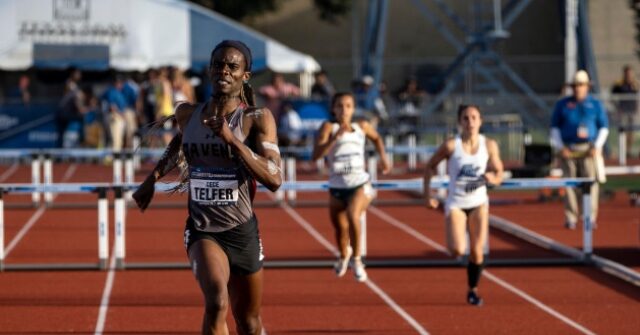
Transgender athlete CeCé Telfer, who sparked controversy by winning the NCAA women’s track & field championship in 2019, is threatening to re-enter women’s track events and claims he will “take all the titles.”
After winning the NCAA title in 2019, Telfer returned to track this year and won a medal at the Women’s Invitational 60m hurdles in Boston in February.
The transgender athlete claimed to have “transitioned” to a woman in 2018 and went from a mediocre competitor as a college male to a sudden top-tier winner after entering women’s competitions in 2019.
Male runner, Cece Telfer, displaced collegiate women in the finals of a women’s invitational meet in Boston last month.
Telfer, the first openly trans-identifying male to win a women’s NCAA national title in the 400m hurdles (2019), ran unattached. After bumping a female… pic.twitter.com/LwEC3zqsJT
— ICONS (@icons_women) March 30, 2024
In a new book, Telfer says he is ready to jump back into track & field competitions and is warning women that he plans to shut them all out of women’s track titles.
“I look forward to indoor track because 2024 indoors is going to be epic,” Telfer exclaimed in an interview with Them. “My dreams were taken away from me once again. So I plan on going back to New England, hitting up all the indoor competitions, and taking all the names, all the records, and everything.”
Telfer decried the bans he faced, especially when he was denied the chance to enter the 2024 Olympic Trials in 2021.
The runner warned that he intends to take as many indoor track titles as possible.
“That doesn’t look like first all the time, that doesn’t look like second place, that doesn’t look like podium all the time, but the track meets that count will count. That’s what’s burning this fire in my heart and in my body. So, it’s keeping me going to know that I can go to indoor competitions and still be the girl to talk about period,” he said.
The NCAA governs indoor track competitions and already has a trans policy allowing male-born trans athletes to compete as women if they meet certain testosterone requirements. The organization is reportedly contemplating some changes in that policy but has yet to delineate what those changes might be.
Other sports organizations have been moving to place strong restrictions and even bans on trans athletes. The National Association of Intercollegiate Athletics (NAIA), for one, recently banned trans athletes in women’s sports.
Telfer blasted the NAIA’s policy and said it was “going backward.”
“Because I’m like, why are we going back? Why are we reverting? We’re literally going back in history,” Telfer told Them. “This is not real life because we were moving forward, and now we’re moving backward. This is scary. The fact that people are powerful enough to move backward is scary, not only for transgender women, but it should be scary for society at large because people think that [anti-trans advocates are] going to stop at transgender women. No. They’ve always been policing women’s bodies. It’s going down to cis women and what’s going on in their lives and their bodies.”
“It breaks my heart because I had an opportunity,” he concluded. “The NCAA saw me. They gave me a chance to be that voice and be that physical change, and they were taking a step in the right direction and obviously creating history, hoping that other organizations would follow.”
Follow Warner Todd Huston on Facebook at: facebook.com/Warner.Todd.Huston, or Truth Social @WarnerToddHuston
